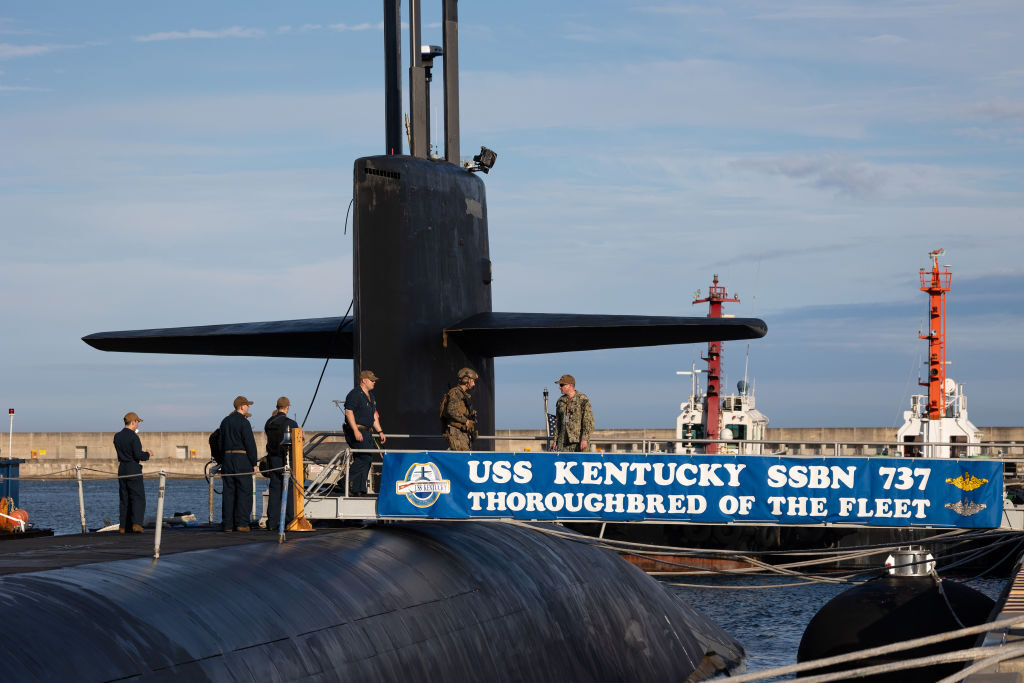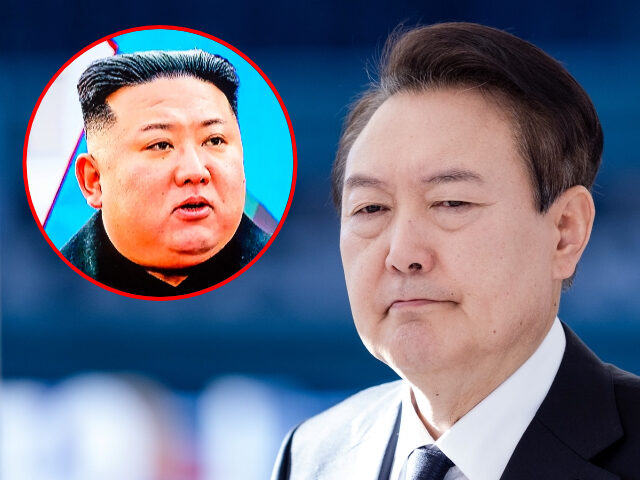South Korean President Yoon Suk-yeol vowed that any North Korean nuclear attack would be “the end of that regime” on Wednesday while touring the USS Kentucky, an Ohio-class nuclear ballistic missile submarine currently stationed in the southern port city of Busan.
Yoon, a hardline conservative, has used his term at the helm of his country to bring South Korea’s foreign policy more in line with America and undo concessions made to the communist North Korean regime under his predecessor, leftist Moon Jae-in. Yoon negotiated the return of American nuclear submarines to the Korean peninsula during a visit to Washington, DC, in April, resulting in the first such vehicles docked in the country since 1981.
Prior to the Kentucky‘s arrival, the USS Michigan, a nuclear-powered submarine arrived in Busan in June. “Unlike Kentucky, Michigan has been converted from carrying nuclear ballistic missiles to fielding 154 Tomahawk Land Attack Missiles,” the U.S. Naval Institute’s news portal (USNI) explained on Tuesday.
The Michigan‘s arrival prompted Pyongyang to threaten military action against the United States. North Korea also tested what it claimed to be a new intercontinental ballistic missile (ICBM) model, the Hwasong-18, with apparent success last week. The United Nations warned that the missile, according to its information, “can reach most points on earth.”
The development of the Hwasong-18 followed an order by communist dictator Kim Jong-un for his country to enact an “exponential increase of the country’s nuclear arsenal” in December.

The USS Kentucky ballistic missile submarine in Busan, South Korea, on Wednesday, July 19, 2023. (SeongJoon Cho/Bloomberg via Getty)
South Korean Defense Minister Lee Jong-seop celebrated the arrival of the Kentucky as “an example of action demonstrating that the US extended deterrence against the Republic of Korea will be firmly implemented” upon its release. Yoon and First Lady Kim Keon-hee boarded the submarine on Monday.
“The USS Kentucky’s deployment shows clearly the commitment of South Korea and the United States to regularly deploy U.S. strategic assets and strengthen the credibility of extended deterrence,” Yoon said during his tour, according to the South Korean news agency Yonhap.
“The two countries will overwhelmingly and resolutely respond to North Korea’s advancing nuclear and missile threats through the NCG and regular deployments of strategic assets, such as the SSBN,” he continued. “By doing so, we will make North Korea not even dream of carrying out a nuclear provocation, and we warned clearly that should North Korea carry out a provocation, it will lead to the end of that regime.”
The Korea JoongAng Daily quoted Yoon as calling the presence of the Kentucky “meaningful and reassuring.” His tour was the first by an allied head of state on an American nuclear ballistic missile submarine.
Yoon’s discussion of the “end” of the brutal communist Kim dynasty in North Korea did not appear to be off-handed, as the same language appeared in a joint statement from the governments of South Korea and America on Tuesday announcing the launch of a “Nuclear Consultative Group” intended to give South Korea more information and power over the nuclear assets within its territory. The creation of the group was part of the “Washington Declaration” signed by Yoon and American President Joe Biden in April, which followed Yoon publicly speculating that South Korea could develop its own nuclear weapons program if it was marginalized out of decisions on American nuclear assets within its borders.
“Any nuclear attack by North Korea against the United States or its allies is unacceptable and will result in the end of that regime,” the joint statement on the Nuclear Consultative Group read, “and the U.S. and ROK [South Korea] sides highlighted that any nuclear attack by the DPRK [North Korea] against the ROK will be met with a swift, overwhelming, and decisive response.”
Communist North Korea has not responded to Yoon’s remarks directly at press time. Its official media arm, the Korean Central News Agency (KCNA), published a screed on Wednesday condemning the “war maniac and traitor Yoon Suk-yeol,” however, claiming that “tens of thousands” of South Koreans were demanding his resignation in rallies throughout the South. KCNA and its state-managed affiliates are the only legal sources of news in North Korea; accessing media not created and controlled by the government is a crime that could lead to imprisonment in a labor camp or death.
In its outburst against Yoon on Wednesday, KCNA accused the South Korean president of trying to “kill” South Korean children “through nuclear threat in collusion with outside forces.”
Last week, in an outraged public statement, Kim Yo-jong – Kim Jong-un’s sister and herself a senior North Korean official – lamented that nuclear war was inevitable thanks to the strengthening ties between Washington and Seoul.
“Due to the aggressive provocations of the U.S. far beyond its constant military readiness, the situation of the Korean peninsula is now heading toward the threshold of nuclear clash,” Kim Yo-jong’s statement read, “and the outbreak of a nuclear war is not hypothetical but is becoming a miserable reality that countries in the Northeast Asian region have to face in the near future.”
“The price the U.S. has to pay for its moves against the DPRK will never be low, and I do not conceal the fact that very unlucky things will wait for the U.S.,” she predicted.

COMMENTS
Please let us know if you're having issues with commenting.